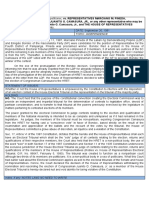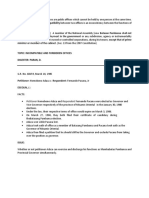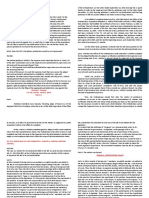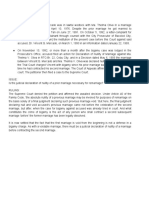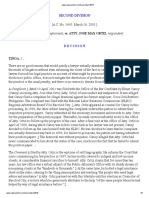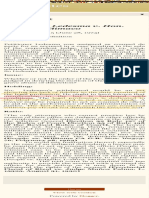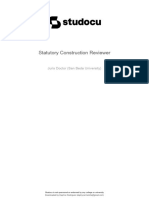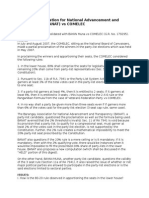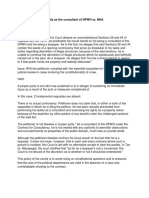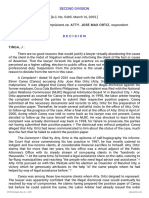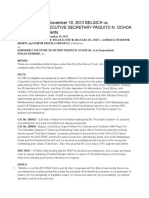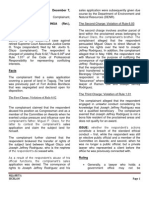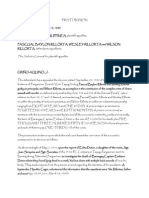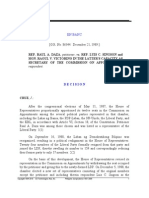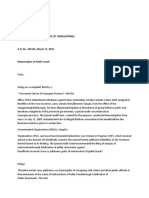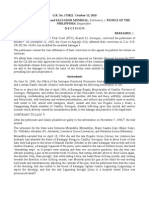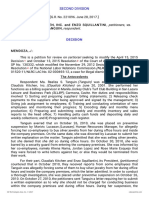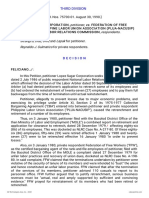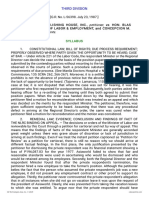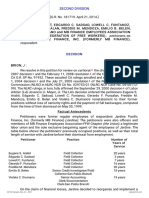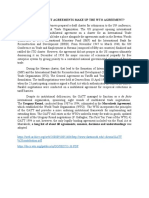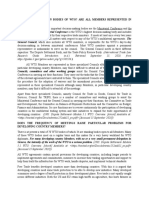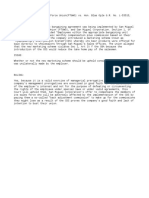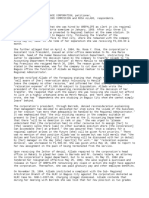Tolentino vs. COMELEC October 16 1971, 41 SCRA 702
Tolentino vs. COMELEC October 16 1971, 41 SCRA 702
Uploaded by
Monica FerilCopyright:
Available Formats
Tolentino vs. COMELEC October 16 1971, 41 SCRA 702
Tolentino vs. COMELEC October 16 1971, 41 SCRA 702
Uploaded by
Monica FerilOriginal Description:
Copyright
Available Formats
Share this document
Did you find this document useful?
Is this content inappropriate?
Copyright:
Available Formats
Tolentino vs. COMELEC October 16 1971, 41 SCRA 702
Tolentino vs. COMELEC October 16 1971, 41 SCRA 702
Uploaded by
Monica FerilCopyright:
Available Formats
FACTS:
The 1971 Constitutional Convention came into being by virtue of two resolutions of
the Congress approved in its capacity as a constituent assembly convened for the
purpose of calling a convention to propose amendments to the Constitution. After
election of delegates held on November 10, 1970, the Convention held its inaugural
session on June 1, 1971. In the morning of September 28, 1970, the Convention
approved Organic Resolution No. 1 which is entitled as, "A RESOLUTION AMENDING
SECTION 1 OF ARTICLE V OF THE CONSTITUTION SO AS TO LOWER THE VOTING AGE TO 18." On
September 30, 1971, the COMELEC "resolved" to follow the mandate of the Convention,
that it will hold the said plebiscite together with the senatorial elections on
November 8, 1971 .
Petitioner, Arturo Tolentino, filed a petition for prohibition, its main thrust
being that Organic Resolution No. 1 and the necessary implementing resolutions
subsequently approved have no force and effect as laws in so far as they provide
for the holding of a plebiscite co-incident with the senatorial elections, on the
ground that the calling and holding of such a plebiscite is, by the Constitution, a
power lodged exclusively in Congress as a legislative body and may not be exercised
by the Convention, and that, under Article XV Section 1 of the 1935 Constitution,
the proposed amendment in question cannot be presented to the people for
ratification separately from each and all other amendments to be drafted and
proposed by the Constitution.
ISSUE:
Whether or not the Organic Resolution No. 1 of the 1971 Constitutional Convention
violative to the Constitution.
HELD:
NO.
All the amendments to be proposed by the same Convention must be submitted to the
people in a single "election" or plebiscite. In order that a plebiscite for the
ratification of a Constitutional amendment may be validly held, it must provide the
voter not only sufficient time but ample basis for an intelligent appraisal of the
nature of the amendment per se but as well as its relation to the other parts of
the Constitution with which it has to form a harmonious whole.
In the present context, where the Convention has hardly started considering the
merits, if not thousands, of proposals to amend the existing Constitution, to
present to the people any single proposal or a few of them cannot comply with this
requirement.
You might also like
- Case Digest - Tolentino v. ComelecDocument1 pageCase Digest - Tolentino v. ComelecJhonrey LalagunaNo ratings yet
- SANIDAD Vs COMELECDocument1 pageSANIDAD Vs COMELECChickoy RamirezNo ratings yet
- Notes, If Any: Notes Lang No Need To WriteDocument2 pagesNotes, If Any: Notes Lang No Need To WriteChristina AureNo ratings yet
- MABANAG Vs LOPEZ VITODocument13 pagesMABANAG Vs LOPEZ VITOPatrick Ryan RamientoNo ratings yet
- Petitioner Homobono Adaza and Respondent Fernando Pacana Were Elected As Governor andDocument5 pagesPetitioner Homobono Adaza and Respondent Fernando Pacana Were Elected As Governor andzeynNo ratings yet
- People Vs Assad Et. Al. AccusedDocument2 pagesPeople Vs Assad Et. Al. AccusedLorelei B RecuencoNo ratings yet
- Pasok V ZapatosDocument4 pagesPasok V ZapatosPatricia GonzalesNo ratings yet
- Automotive Industry Workers Alliance V. Romulo (2005)Document1 pageAutomotive Industry Workers Alliance V. Romulo (2005)JeromeBernabeNo ratings yet
- Complainant Vs Vs Respondent: First DivisionDocument6 pagesComplainant Vs Vs Respondent: First DivisionPaul Joshua Torda SubaNo ratings yet
- DigestsDocument72 pagesDigestsBrillantes VhieNo ratings yet
- Duque vs. COMELECDocument4 pagesDuque vs. COMELECTrisha Marie SungaNo ratings yet
- Consti Cases Art 8Document12 pagesConsti Cases Art 8AysNo ratings yet
- MERCADO vs. TANDocument1 pageMERCADO vs. TANsabethaNo ratings yet
- Canoy Vs OrtizDocument6 pagesCanoy Vs OrtizShari ThompsonNo ratings yet
- Contract of LeaseDocument3 pagesContract of LeaseSteve UyNo ratings yet
- G.R. No. 56350. April 2, 1981 Digest (B)Document1 pageG.R. No. 56350. April 2, 1981 Digest (B)Maritoni RoxasNo ratings yet
- De Castro V JBC, Mar17'10 - DigestDocument1 pageDe Castro V JBC, Mar17'10 - DigestKyle GwapoNo ratings yet
- Javellana VDocument2 pagesJavellana VJessie Marie dela PeñaNo ratings yet
- Ledesma V ClimacoDocument1 pageLedesma V ClimacoCherish Kim FerrerNo ratings yet
- Republic of The Philippines Supreme Court ManilaDocument4 pagesRepublic of The Philippines Supreme Court ManilaJezra DelfinNo ratings yet
- in Re: Rodolfo Manzano 166 SCRA 246 (1988) FactsDocument5 pagesin Re: Rodolfo Manzano 166 SCRA 246 (1988) FactsBarachielNo ratings yet
- Statutory Construction ReviewerDocument33 pagesStatutory Construction ReviewerDaphne RodriguezNo ratings yet
- Philconsa V MathayDocument1 pagePhilconsa V MathayAlvin HilarioNo ratings yet
- CLU v. Exec SecDocument2 pagesCLU v. Exec SecGRNo ratings yet
- 3 Banat Vs ComelecDocument4 pages3 Banat Vs ComelecEmmanuel C. DumayasNo ratings yet
- Statutes Proper (Legislative Enactments) : Insular Government Unincorporated TerritoryDocument5 pagesStatutes Proper (Legislative Enactments) : Insular Government Unincorporated TerritoryMarivic Asilo Zacarias-LozanoNo ratings yet
- Fabian Desierto Report ConstiDocument4 pagesFabian Desierto Report ConstiMarivic Asilo Zacarias-LozanoNo ratings yet
- Macasiano VS NHADocument2 pagesMacasiano VS NHAMilcah MagpantayNo ratings yet
- Canoy vs. Ortiz PDFDocument6 pagesCanoy vs. Ortiz PDFGideon InesNo ratings yet
- Rivera Vs Angeles and Pimentel Vs Lorente DigestDocument2 pagesRivera Vs Angeles and Pimentel Vs Lorente Digestzatarra_12No ratings yet
- Del Rosario vs. Comelec, 35 SCRA 367 (1970), G.R. L-32476, 20 October 1970Document2 pagesDel Rosario vs. Comelec, 35 SCRA 367 (1970), G.R. L-32476, 20 October 1970EriyunaNo ratings yet
- G.R. No. 208566 November 19, 2013 BELGICA vs. Honorable Executive Secretary Paquito N. Ochoa JR, Et Al, RespondentsDocument5 pagesG.R. No. 208566 November 19, 2013 BELGICA vs. Honorable Executive Secretary Paquito N. Ochoa JR, Et Al, Respondents1222No ratings yet
- March1 DigestsDocument14 pagesMarch1 DigestsShauna HerreraNo ratings yet
- JMM Promotions and Management CASE DIGESTDocument2 pagesJMM Promotions and Management CASE DIGESTNasrullah GuiamadNo ratings yet
- Canons 1-6Document22 pagesCanons 1-6Ezekiel T. MostieroNo ratings yet
- IBP VsDocument3 pagesIBP VsKenneth BuñagNo ratings yet
- Freedom of ReligionDocument13 pagesFreedom of ReligionChristian TajarrosNo ratings yet
- Diaz v. People GR 65006, Oct. 31, 1990: FactsDocument2 pagesDiaz v. People GR 65006, Oct. 31, 1990: FactsJohn Lester LantinNo ratings yet
- Political Party Membership Prop. RepresentativesDocument1 pagePolitical Party Membership Prop. RepresentativesChristyBagalacsaNo ratings yet
- 064-2003-Ang Bagong Bayani-OFW Labor Party V PDFDocument23 pages064-2003-Ang Bagong Bayani-OFW Labor Party V PDFRoyce HernandezNo ratings yet
- Stat Con Materials For StudentsDocument18 pagesStat Con Materials For Studentsmench_barredoNo ratings yet
- GR 196231Document1 pageGR 196231Marj LoNo ratings yet
- ESTRADA vs. SandiganbayanDocument4 pagesESTRADA vs. SandiganbayanJoycee ArmilloNo ratings yet
- Philippine Press Institute V COMELECDocument2 pagesPhilippine Press Institute V COMELECDana Denisse RicaplazaNo ratings yet
- Set 5Document57 pagesSet 5Zepht BadillaNo ratings yet
- A.M. No. 10-5-7-SC December 7, 2010 Jovito S. Olazo, Justice Dante O. Tinga (Ret.)Document4 pagesA.M. No. 10-5-7-SC December 7, 2010 Jovito S. Olazo, Justice Dante O. Tinga (Ret.)gerrymanderingNo ratings yet
- People V Rillorta, GR No. 57415Document7 pagesPeople V Rillorta, GR No. 57415Jae MontoyaNo ratings yet
- Pamatong v. COMELEC, GR No. 161872, April 13, 2004Document5 pagesPamatong v. COMELEC, GR No. 161872, April 13, 2004Mctc Nabunturan Mawab-montevista100% (1)
- GONZALES Vs COMELECDocument5 pagesGONZALES Vs COMELECSapphireNo ratings yet
- Nestle Phils. v. Hon. SanchezDocument2 pagesNestle Phils. v. Hon. SanchezOliver BalagasayNo ratings yet
- In Re - Petition of Michael Madado, Bar Matter No. 2540, September 24, 2013Document5 pagesIn Re - Petition of Michael Madado, Bar Matter No. 2540, September 24, 2013Cherry ursuaNo ratings yet
- Daza vs. Singson GR No. 86344 December 21, 1989Document12 pagesDaza vs. Singson GR No. 86344 December 21, 1989Marky Rojo100% (1)
- Violeta Bahilidad Vs People of ThephilippinesDocument2 pagesVioleta Bahilidad Vs People of ThephilippinesXezarajjah VillanuevaNo ratings yet
- Estarija v. RanadaDocument14 pagesEstarija v. RanadaJ. JimenezNo ratings yet
- V.2.Tolentino v. COMELEC GR No.148334Document2 pagesV.2.Tolentino v. COMELEC GR No.148334ElleNo ratings yet
- Atizado Vs PeopleDocument9 pagesAtizado Vs PeopleGee AnneNo ratings yet
- CSC V Pobre FactsDocument20 pagesCSC V Pobre FactsFrinz CastilloNo ratings yet
- IBP vs. Zamora G.R. No.141284, August 15, 2000Document3 pagesIBP vs. Zamora G.R. No.141284, August 15, 2000meme bolongonNo ratings yet
- Tilted Justice: First Came the Flood, Then Came the Lawyers.From EverandTilted Justice: First Came the Flood, Then Came the Lawyers.Rating: 5 out of 5 stars5/5 (1)
- Tolentino Et Al Vs COMELECDocument1 pageTolentino Et Al Vs COMELECMary Licel RegalaNo ratings yet
- FASAP v. PAL PDFDocument22 pagesFASAP v. PAL PDFMonica FerilNo ratings yet
- Deoferio v. Intel Technology Philippines, Inc PDFDocument9 pagesDeoferio v. Intel Technology Philippines, Inc PDFMonica FerilNo ratings yet
- Claudia - S Kitchen, Inc. v. Tanguin PDFDocument10 pagesClaudia - S Kitchen, Inc. v. Tanguin PDFMonica FerilNo ratings yet
- Sangwoo Phils., Inc. v. Sangwoo Phils., Inc. Employees Union-OLALIA PDFDocument7 pagesSangwoo Phils., Inc. v. Sangwoo Phils., Inc. Employees Union-OLALIA PDFMonica FerilNo ratings yet
- Petitioner vs. vs. Respondents Sicangco, Diaz, Ortiz Lapak Reynaldo J. GulmaticoDocument9 pagesPetitioner vs. vs. Respondents Sicangco, Diaz, Ortiz Lapak Reynaldo J. GulmaticoMonica FerilNo ratings yet
- Petitioner Vs VS: Second DivisionDocument15 pagesPetitioner Vs VS: Second DivisionMonica FerilNo ratings yet
- Santos - v. - Court - of - Appeals PDFDocument11 pagesSantos - v. - Court - of - Appeals PDFMonica FerilNo ratings yet
- PCL Shipping Phils., Inc. v. National Labor Relations Commission PDFDocument11 pagesPCL Shipping Phils., Inc. v. National Labor Relations Commission PDFMonica FerilNo ratings yet
- Petitioner vs. vs. Respondents: Third DivisionDocument7 pagesPetitioner vs. vs. Respondents: Third DivisionMonica FerilNo ratings yet
- Asufrin - Jr. - v. - San - Miguel - Corp PDFDocument6 pagesAsufrin - Jr. - v. - San - Miguel - Corp PDFMonica FerilNo ratings yet
- Shimizu - Phils. - Contractors - Inc. - v. - Callanta PDFDocument8 pagesShimizu - Phils. - Contractors - Inc. - v. - Callanta PDFMonica FerilNo ratings yet
- Arabit - v. - Jardine - Pacific - Finance - Inc PDFDocument11 pagesArabit - v. - Jardine - Pacific - Finance - Inc PDFMonica FerilNo ratings yet
- Sebuguero - v. - National - Labor - Relations20181025-5466-1r7f8ow PDFDocument11 pagesSebuguero - v. - National - Labor - Relations20181025-5466-1r7f8ow PDFMonica FerilNo ratings yet
- Wiltshire - File - Co. - Inc. - v. - National - Labor PDFDocument9 pagesWiltshire - File - Co. - Inc. - v. - National - Labor PDFMonica FerilNo ratings yet
- Great - Pacific - Life - Assurance - Corp PDFDocument4 pagesGreat - Pacific - Life - Assurance - Corp PDFMonica FerilNo ratings yet
- How Many Different Agreements Make Up The Wto Agreement?: Contribution PDFDocument3 pagesHow Many Different Agreements Make Up The Wto Agreement?: Contribution PDFMonica FerilNo ratings yet
- Imasen vs. AlconDocument2 pagesImasen vs. AlconMonica FerilNo ratings yet
- NO. 5 Main Bodies of The WTODocument2 pagesNO. 5 Main Bodies of The WTOMonica FerilNo ratings yet
- SMB Sales Vs OPLE DigestDocument1 pageSMB Sales Vs OPLE DigestMonica FerilNo ratings yet
- GREPALIFE vs. NATIONAL LABOR RELATIONS COMMISSION and ROSA ALLADODocument2 pagesGREPALIFE vs. NATIONAL LABOR RELATIONS COMMISSION and ROSA ALLADOMonica FerilNo ratings yet
- ASUFRIN, JR., v. SAN MIGUEL CORPORATIONDocument2 pagesASUFRIN, JR., v. SAN MIGUEL CORPORATIONMonica FerilNo ratings yet
- LOPEZ SUGAR CORP. vs. PLUA-NACUSIPDocument1 pageLOPEZ SUGAR CORP. vs. PLUA-NACUSIPMonica FerilNo ratings yet
- ARABIT vs. JARDINE PACIFIC FINANCE, INC. (FORMERLY MB FINANCE)Document2 pagesARABIT vs. JARDINE PACIFIC FINANCE, INC. (FORMERLY MB FINANCE)Monica FerilNo ratings yet
- GREAT PACIFIC LIFE ASSURANCE CORPORATION Vs NLRCDocument3 pagesGREAT PACIFIC LIFE ASSURANCE CORPORATION Vs NLRCMonica FerilNo ratings yet


